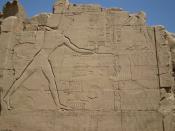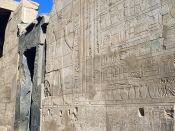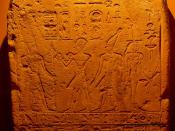The Kings or pharaohs of Ancient Egypt were the most powerful humans of the Ancient World. Thutmose III had a particularly interesting and radical career as pharaoh in contrast with previous pharaohs of antiquity. To ascertain whether Thutmose III was a pharaoh who benefited the Egyptian people or not the following aspects will be examined: the development of the King through his childhood and adolescent years, the campaigns fought by the King and the structures that he built that add to the mystic and phenomenal civilization of the Ancient Egyptians. These aspects of Thutmose III's reign will be examined through sources, and educated assumptions will be made upon the evaluation of the reliance of sources obtained.
Firstly, King Thutmose III was the sixth ruler of the 18th dynastical period of Egyptian history. Records written during his reign depict him as a strong warrior pharaoh with a somewhat controversial start to his reign.
One particular source, written by the Royal Scribe of Thutmose , speaks of Thutmose being denied his blood right to the royal throne by his stepmother, Queen Hatshepsut. In ancient Egyptian law, the wife of the Pharaoh may rule as Pharaoh until a legitimate heir has achieved adulthood, upon which the title of Pharaoh must be passed on to the heir. Queen Hatshepsut, however, continued ruling well passed her "expiry date", for a total of 35 years . This would have naturally infuriated Thutmose, who was being denied his birthright. His anger can be seen by the fact that he not only stripped Hatshepsut's priests and officials of any title they had but also, and most notable of exactly how Pharaohs of this Dynasty sought vengeance upon past Pharaohs, he demolished structures and physically removed Hatshepsut's name from every written record in the land .


